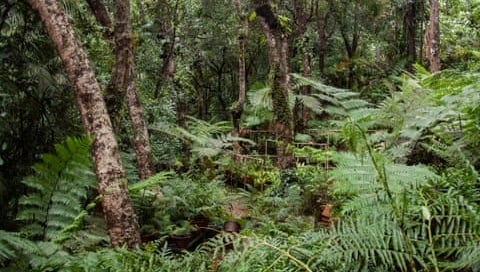Sunny climate stormy climate | Weekly digest #71
The rainforest gardeners creating a hotspot of biodiversity in Kerala, a severe heat wave in Europe and the impact of the US stopping sharing data on sea ice.
Hello folks!
Welcome to another edition of your regular climate news digest, where I bring one sunny story that gives hope and two stormy ones that are a cause for alarm. Hope you like them!
🌞 Sunny news 🌞
1. These rainforest gardeners have created a hotspot of biodiversity in Kerala
What are we talking about?
Gurukula botanical sanctuary is a collectively owned private sanctuary situated at the edge of Periyar reserve forest in northern Kerala
It was started in 1981 by Wolfgang Theuerkauf, a German from Berlin who later became an Indian citizen. Theuerkauf sought to protect the 3 hectares of old-growth rainforest he had been given by a guru at a spiritual institution he attended, and began gathering rare and endemic plants from adjoining lands that were being cleared to make way for plantations and agriculture.
Today, the sanctuary has grown to 32 hectares by adding 1-7 acre parcels and has also become a haven for more than 2,000 native plant species from southern India and particularly from the Western Ghats.
A team of 20 women, mostly local people with some from Indigenous communities, look after the plants in the nursery and the garden while working on restoration.
Why does this matter?
The Western Ghats are one of the most important biodiversity hotspots in the world. They stretch for 1,600km, host a variety of habitats from tropical forests to montane grasslands and have a large number of species unique to the area. However, this ecosystem is under constant and heavy threat from urban sprawl, industrial and mining activity and deforestation.
The Gurukula botanical sanctuary is part of the mountain range but the tiny enclave is a refuge for up to 40% of all plant species found in the entire Western Ghats.
While crop seed vaults are common around the world, nurseries for wild and native plants are rare, and many plant species quietly become extinct.
It’s a rare example of someone taking the long but secure road to complex rainforest recovery in an era when simply planting trees is seen as a quick and easy fix to climate change and deforestation.
Sources for further reading
🌩️ Stormy news 🌩️
2. A severe heatwave is sweeping across Europe: wildfires in Turkey, restrictions on outdoor work in Italy and tourist sites being closed down

What are we talking about?
An intense heatwave has scorched Europe with many places recording temperatures above 40 degrees Celsius. Heat warning alerts have been issued in some countries including France and the UK.
France issued a red alert – the highest extreme heat warning – for 16 places, including Paris. Amid the severe heatwave, as many as 1,350 schools across France were fully or partially shut. The top of the Eiffel Tower was closed through Wednesday as a result of the heat.
Turkey is seeing wildfires in its western region, with over 50,000 people evacuated to safe zones. A rise in temperatures, dry weather and powerful winds have sparked 342 fires across the country
Italy has put restrictions on outdoor work to protect workers from the extreme heat. A 47-year-old died in Bologna after falling ill at a construction site.
Why does this matter?
Heat extremes like these have clear ties to long term global warming, as their likelihood and severity increases significantly as global average temperature rises.
The level of heat we are experiencing now is not just uncomfortable but dangerous and at times fatal, as we can see in the examples of impact mentioned above.
Heat is often called a silent killer and is in fact the deadliest form of extreme weather in the US.
Sources for further reading
3. US to stop sharing data on sea ice
What are we talking about?
The National Snow and Ice Data Centre (NSIDC), based at the University of Colorado, maintains a Sea Ice Index to track the near-real-time state of sea ice around the globe.
However, the centre has said the US government’s Department of Defence, which owns the satellites that contain onboard instruments used to track sea ice, would stop “processing and delivering” the data on 31 July.
A US Navy spokesperson confirmed the data processing from its defence meteorological satellite program (DMSP) would stop on 31 July “in accordance with Department of Defense policy.”
Why does this matter?
Tracking the state of sea ice is crucial for scientists to understand how global heating is affecting the planet. Sea ice reflects the sun’s energy back out to space but, as long-term losses have been recorded, more of the planet’s ocean is exposed to the sun’s energy, causing more heating.
Scientists have said - “It’s our early warning system and tells us if the patient is about to flatline. We need this data and now [the scientific community] will be forced to put together a record from a different instrument. We won’t have that continued context that we have had previously.”
For instance, recently research has found a link between increasing numbers of icebergs calving from floating ice shelves and the loss of sea ice. The study also outlined other knock-on effects from the record low sea ice levels in the Antarctic, including the loss of more seals and penguins if trends continued.
Sources for further reading
You can read previous editions of the newsletter -
Sunny climate, stormy climate | News Digest #70
Sunny climate, stormy climate | News Digest #69
Sunny climate, stormy climate | News Digest #68
If you liked this newsletter, please hit like or leave a comment. If you are a climate champion and want to take this conversation to more people, please share the newsletter with a friend, family member or colleague who may like it too!





Very good info from around the world